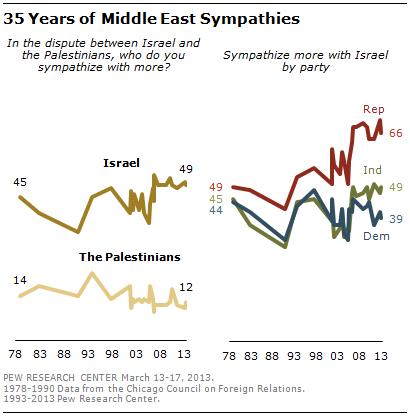A new Pew Research Center poll demonstrates that Republicans are much more sympathetic to Israel than Democrats, a wider partisan divergence than has ever existed before. The poll finds that when asked if their sympathies are more with Israelis or Palestinians, 66 percent of Republicans choose Israel compared with 49 percent of independents and just 39 percent of Democrats.
The divergence is significant for several reasons.
The first is that it is Democrats and not Republicans who have been the Israeli government and lobby’s mainstay of support in Congress since the establishment of the state, starting with Jewish members of the House and Senate. The current 113th Congress is typical: of the 33 Jewish members of the two Houses, only one (Rep. Eric Cantor of Virginia) is a Republican.
As for Jewish voters, in the 2012 election 70 percent voted for President Barack Obama which was close to the norm. Even in terrible years for Democrats, like the 1972 Nixon-McGovern blowout, Democrat McGovern received 65 percent of the Jewish vote. As for campaign contributions, it is estimated that 60 percent of the money that the Democratic party raises comes from Jews, by far dwarfing the contributions of a few highly-publicized Republican donors like Sheldon Adelson.
 In short, it makes sense that Democrats have always taken the lead on matters relating to Israel, with Republicans playing catch-up, and none too well. Yes, they offer hardline rhetoric but, on nuts-and-bolts issues like the Israel aid package and making sure that U.S. pressure is not applied to Israel, it is the Democrats, like Vice President Joe Biden, who are the ball game.
In short, it makes sense that Democrats have always taken the lead on matters relating to Israel, with Republicans playing catch-up, and none too well. Yes, they offer hardline rhetoric but, on nuts-and-bolts issues like the Israel aid package and making sure that U.S. pressure is not applied to Israel, it is the Democrats, like Vice President Joe Biden, who are the ball game.
The second reason that the partisan divergence is significant is that few Jews vote Democratic based on Israel policy. According to the comprehensive American Jewish Committee survey of Jewish public opinion, only 4.5 percent vote with their eye on Israel. That number is dwarfed by the 80 percent whose vote turns on the economy, health care and social security.
Nonetheless, it is those donors and voters who do think of Israel first when making their political choices that has produced such wall-to-wall support among Democratic elected officials. Why not? On one side there are people whose vote and financial contributions turn on Israel while, on the other, there is … nothing.
Until now there has been no force within the Democratic Party arguing that America’s uncritical support of Israeli policies may be bad for America and that it, by helping to sustain the 45-year-old occupation, is morally wrong. Among Republicans indifference to the moral implications of the occupation would not be expected to cause much concern but among Democrats it should.
And now, according to the Pew poll, it is.
So far, this divergence has not been reflected in policy as Obama’s trip to Israel indicated. In Jerusalem and Tel Aviv, his excessive rhetoric about his devotion to Israel seems, in retrospect, almost like parody. It is as if he decided that if those who doubted his support for Israel as demonstrated by his administration’s actions remained dissatisfied, he would give them the kind of over-the-top rhetoric that would make AIPAC blush. And he did.
And no one complained. The lobby loved it and few others cared.
But, as the Pew poll demonstrates, the Democratic Party is changing.
| “As the Pew poll demonstrates, the Democratic Party is changing.” |
As the Democratic party increasingly becomes the party of blacks, browns and newer immigrants, support for Israel declines. And why wouldn’t it? After all, Palestinians might not look quite so alien to non-white Democrats. And the Israelis might not seems so “just like us” to them.
Moreover, it is not just “minority” Democrats who are likely to move the Democratic Party away from undying devotion to Israeli policies. It is also the party’s activist base which has been dominated by anti-war types since the Vietnam War. Support for Israel’s hardline policies is a natural for the Republican grassroots; it fits in with their worldview. Democrats should be expected to be more sympathetic to Palestinians. And, as I know from years of personal experience on Capitol Hill, they are, but are simply afraid to antagonize the lobby.
But what if, suddenly, they start hearing from the party’s base not that they should support Israeli policies but that they should support an end to the occupation and security and sovereignty for both Israelis and Palestinians?
What if the 61 percent of Democrats who are not more sympathetic to Israel than to Palestinians started sensing their own strength and began pushing back? What if the issue of U.S. support for the occupation started being raised in Democratic primaries and affected campaign contributions too?
What if, as the Pew poll suggests, the Republican Party became the home of Israel hardliners while the Democratic Party with its base of labor, gays, non-whites, liberal Jews and progressives became the party of those who want their country to finally become the Middle East “honest broker” we pretend we are.
That could make all the difference.
The Democratic Party is changing and the rate of change will accelerate as its base continues to be transformed. Let the lobby shift its attention to the Republicans, its natural home, while Democrats finally reject a policy that is the vestige of the bad old days. No, Obama is not going to be that change, nor will Joe Biden or Hillary Clinton.
That change, like the opposition to the Vietnam War, will have to come from the grassroots. And it will.
M.J. Rosenberg is The Washington Spectator‘s Special Correspondent for Middle East Affairs. He was most recently a Foreign Policy fellow at Media Matters For America. Previously, he spent 15 years as a Senate and House aide. Early in his career he was editor of AIPAC’s newsletter Near East Report. From 1998-2009, he was director of policy at Israel Policy Forum. Follow him @MJayRosenberg and @WashSpec.



0 Comments